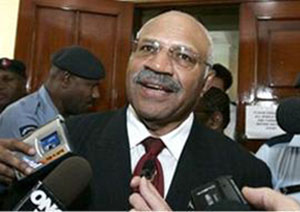
Arvind Kumar
OPINION: AUCKLAND (Pacific Scoop / Pacific Media Watch): Almost 25 years after committing treason by carrying out a military coup against a democraticallyelected government, Major-General Sitiveni Rabuka recently apologised to the Fiji public.
He was sorry, he told the Fiji public- and the world – for the “wrongs” which began at the barrel of the gun at 10am on May 14, 1987, as Parliament met for the day. Then a lieutenant-colonel, Rabuka and his armed henchmen marched into Parliament and took the multicultural government of Dr Timoci Bavadra into captivity.
The event sent ripples around the South Pacific and the world. The moment marked the death of “democratic” rule in the island nation best known for its friendly people and its white, sandy beaches.
Riots and looting followed in the streets of the capital Suva. The rioters: mostly young indigenous Fijians storming the streets to “celebrate” the inauspicious event. The target: the Indian community – rich or poor, man or woman.
Another coup followed on September 25, and Rabuka went on the serve two terms as elected Prime Minister after constitutional change.
In Auckland, Rabuka’s apology was labelled “too little, too late” by the Coalition for Democracy in Fiji spokesman Nikhil Naidu.
“We have already forgiven him for destroying our lives,” Naidu said.
Mass exodus
Strong words indeed.
Thousands of Indians had begun began a mass exodus from Fiji to places where their rights would not be suppressed at the point of the gun.
Rabuka’s apology has brought back painful memories for the thousands of Indians living in Fiji and abroad.
Would they have ever left the country if things hadn’t changed? No.
Naidu is right to point out that Rabuka’s apology is incomplete without him revealing the plotters behind the coups – the thousands of the mainly Indian community deserve to know.
I, personally, newly married just months earlier, felt robbed of happiness in what should have been the happiest days of my life.
As a young journalist at the Fiji Sun, I was subjected to service in the newsroom as young “trigger-happy” soldiers stood behind us with the guns pointed at our heads. Not to mention the riot where I was punched in the head by unknowns as the company driver drove me home on the day of the coup, nor the moment my father burst into tears the moment he learned I had been bashed.
Emergency laws
I had never seen my father cry before. I had never seen a gun in my life either, let alone an AK-47.
Prime Minister Voreqe Bainimarama recently eased emergency laws which have governed the country for the past five years.
As Naidu pointed out, a step in the right direction, but nothing to celebrate about.
Why the apology now when Rabuka knows full well that his actions of 1987 have resulted in the population of Indians in Fiji plummeting from more than 50 per cent to just over 30 per cent now?
Is it the comforting thought that Indians – the very people the coups were carried out against – are no longer a threat as far as political domination is concerned?
Or is it the fact that elections are drawing close and the coup pioneer has aspirations for office?
Does the apology mean that he will attempt to right the wrongs he did in 1987?
Exposé needed
Does Rabuka feel that his apology will stop other aspiring Rabukas and Bainimaramas carrying out coups in the future? Was Bainimarama inspired by Rabuka’s coups?
Whatever the case, the fact is that indigenous Fijian rights have never been under threat from any other race as they were always enshrined in the 1970 Constitution.
Rabuka needs to tell all and expose the people behind his coups to redeem himself and ease the hurt of those affected by his actions; only then can the people of Fiji move forward with optimism.
Arvind Kumar is online editor of the Auckland-based Indian Weekender.

This work is licensed under a Creative Commons Attribution-NonCommercial 3.0 New Zealand License.



